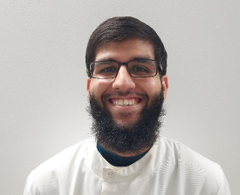As part of Healthcare Science Week 2023 , Junayd Umarji, Student 
Why did you choose a career in Pathology?
I’ve always enjoyed working within a laboratory, conducting experiments and analysing samples. As the science of Pathology advances, I’m forever introduced to new approaches to sampling, discovering new features of the human body over time. This has helped me understand the way the body works, applying this knowledge to the experimental practises used in my day-to-day life as a student at university and on placement.
What does a typical day involve?
As a placement student, I was introduced to Pathology in Biochemistry, learning the foundations of a scientist in training. Upon completing training in various areas of the laboratory, I was able to process samples including:
- Serum and Urine Osmolality
- Routine sampling – bone profile, liver profile, urea and electrolytes etc
- HbA1c analysis
- Troubleshooting, quality control and calibration
How does your job impact on patient health?
By being able to process these samples, I’m able to produce accurate and precise results which is used by doctors and nurses to provide the best medical care for their patient.
What has been your biggest achievement so far?
Having been given the opportunity to complete my IBMS Registration Portfolio as part of being accepted in completing a placement year.
What would you say to someone thinking about a career in Pathology?
Always strive to develop your skills and improve on existing knowledge about pathology. Try to gain experience by applying for various opportunities that your university or local hospital has to offer. No experience is a bad experience, in the end its how you use what you have learned to make your experiences worthwhile.
